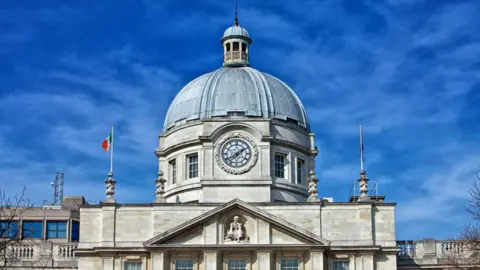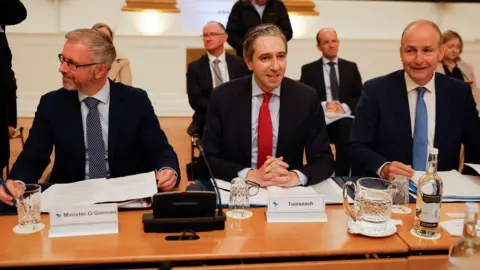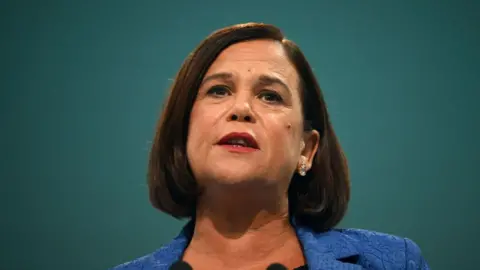Irish parliament meets final time before election
 Getty Images
Getty ImagesPoliticians in the Republic of Ireland have met for the final time before the three-week general election campaign begins.
The Taoiseach (Irish prime minister) announced that he would seek to dissolve the 33rd Dáil (lower house of Irish parliament) on Friday ahead of calling the snap poll.
Simon Harris, the leader of Fine Gael said it was likely the election date would be Friday 29 November.
A general election must be called in the Republic of Ireland before the term ends on March 2025.
Harris said he wanted to wait until the Finance Bill, which enacts the Budget changes and contains new tax provisions, was passed before calling the election.
"It was important to do this in a way that was respectful, respectful to the budgetary process, respectful to getting the legislation passed and also making sure this coalition government, which has worked well, could come to an amicable end and I think we are now ready to put our case to the people in the weeks ahead," he said on Wednesday.
“I look forward to the weeks ahead and asking the people of Ireland for a mandate.”
Who is in power at the minute?
Three parties - Fine Gael, Fianna Fáil and The Green Party - make up the coalition government in the Republic of Ireland.
Voters last went to the polls in February 2020 where Fianna Fáil, led by Micheál Martin, won the most seats (38).
But the party fell short of a majority and entered into negotiations with Fine Gael, who led the then-outgoing government, and the Green Party.
An agreement on a coalition deal was reached four months later, having been delayed due to the coronavirus pandemic, in June 2020.
 EPA
EPAAs part of the agreement, the role of taoiseach was to be swapped between Fianna Fáil and Fine Gael mid-way through the five-year term.
Martin held the top role until December 2022, before then-Fine Gael leader Leo Varadkar took on the reigns.
Varadkar announced he was resigning from the role earlier this year. Harris then took over as taoiseach in April after winning the party's leadership contest.
Sinn Féin, who recorded a historic result in the 2020 election after winning 37 seats, currently lead the opposition.
Its leader Mary Lou McDonald had described the outcome as "something of a revolution in the ballot box".
A number of other parties, such as Labour, Social Democrats, People Before Profit, Aontú and independents, also make up the opposition.
Analysis: Enda McClafferty, BBC News NI political editor
This was to be Sinn Féin’s breakthrough election - the moment of truth for the most popular party in the last election four years ago.
Its leader Mary Lou McDonald was even considered the Taoiseach-in-waiting.
But much of that Sinn Féin optimism has drained away over the past year.
From the dizzy heights of a poll rating in the mid-30s post election last time, the party has fallen back to around 18%.
While polls come with a health warning, they do present a pattern which was borne out in the European and Council election earlier this year when Sinn Féin performed poorly.
Since then, the party has struggled to deal with series of internal party controversies and lost two TDs along the way.
 Getty Images
Getty ImagesThe election campaign now allows the party to change the narrative and to focus on the key battleground issues.
They are health, housing, cost of living and immigration.
If the polls are right, Sinn Féin has a lot of ground to make up on its rivals Fine Gael and Fianna Fáil.
But much can happen in an election campaign if one as short as three weeks.
